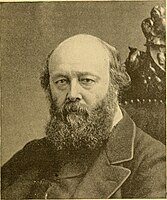Second Salisbury ministry (original) (raw)
From Wikipedia, the free encyclopedia
| Second Salisbury ministry | |
|---|---|
 |
|
| 1886–1892 | |
 Salisbury (1892) Salisbury (1892) |
|
| Date formed | 25 July 1886 (1886-07-25) |
| Date dissolved | 11 August 1892 (1892-08-11) |
| People and organisations | |
| Monarch | Victoria |
| Prime Minister | Lord Salisbury |
| Total no. of members | 113 appointments |
| Member parties | Conservative Party |
| Status in legislature | Minoritydependent on Liberal Unionist support |
| Opposition party | Liberal Party |
| Opposition leaders | William Ewart Gladstonein the House of CommonsLord Granville (1886–1891)Lord Kimberley (1891–1892)in the House of Lords |
| History | |
| Election | 1886 general election |
| Outgoing election | 1892 general election |
| Legislature terms | 24th UK Parliament25th UK Parliamentlost a vote of confidence |
| Predecessor | Third Gladstone ministry |
| Successor | Fourth Gladstone ministry |
The Marquess of Salisbury formed his second ministry, in an alliance with the Liberal Unionist Party, following the 1886 general election and his reappointment as the British prime minister by Queen Victoria.
- In 1887 a Liberal Unionist, George Goschen, joined the ministry as Chancellor of the Exchequer.[C. K. 1975]: 51
- February 1888 – Sir Michael Hicks Beach succeeds Lord Stanley of Preston as President of the Board of Trade.
- September 1889 – Henry Chaplin enters the Cabinet as President of the Board of Agriculture.
- October 1891 – Arthur Balfour succeeds the late William Henry Smith as First Lord of the Treasury and Leader of the House of Commons. William Jackson succeeds him as Chief Secretary for Ireland.
Note: Cabinet members are listed in bold face.
- ^ The position of prime minister was not a formal ministerial office.
- ^ a b c Also served as Leader of the House of Commons.
- ^ Walrond inherited a baronetcy in 1889.
- ^ a b Entered the Cabinet in April 1887.
- ^ Office abolished in 1888.
- ^ Holland was created Baron Knutsford on 23 February 1888.
- ^ Manners succeeded as the 7th Duke of Rutland on 4 March 1888.
- ^ Balfour entered the Cabinet in November 1886.
- ^ Stanley was created Baron Stanley of Preston on 27 August 1886.
- ^ Folkestone succeeded as the 5th Earl of Radnor on 11 March 1889.
- Tout, T. F. (1910). An Advanced History of Great Britain from the Earliest Times to the Death of Edward VII (new ed.). New York: Longmans, Green (published 1912). pp. 740–741
 . OL 13991885M.
. OL 13991885M. - Cook, Chris; Keith, Brendan (1975). British Historical Facts: 1830–1900. Palgrave Macmillan UK. ISBN 978-1-349-01348-7.